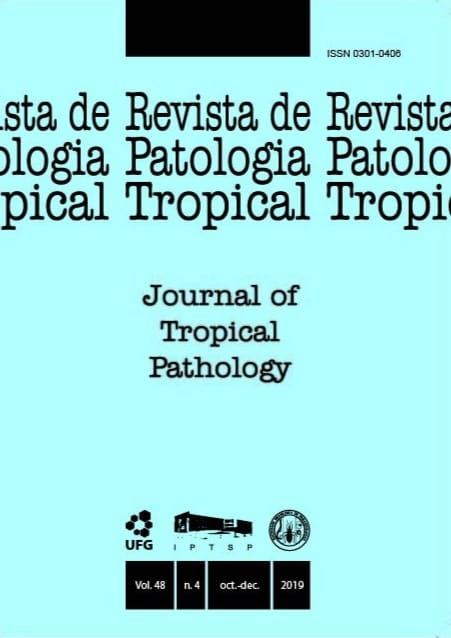CHEMICAL COMPOSITION, LARVICIDAL ACTIVITY AND RESIDUAL EFFECT OF Pterodon polygalaeflorus (BENTH.) BENTH. (FABACEAE) FRUIT OIL EXTRACTS AGAINST Aedes aegypti (DIPTERA: CULICIDAE)
DOI:
https://doi.org/10.5216/rpt.v48i4.62119Resumo
The purpose of this study was to investigate the larvicidal activity of Pterodon polygalaeflorus oil extract against the mosquito vector Aedes aegypti. For this, crushed P. polygalaeflorus fruit underwent solvent extraction to obtain the oil extract. The chemical characterization was performed by gas chromatography coupled to mass spectrometry. For the bioassays third instar larvae of Ae. aegypti were utilized. Tests were carried out to determine the larvicidal activity and the residual effect under laboratory conditions, as well as field screening (small scale).
The major components of P. polygalaeflorus oil extract were, respectively, E-caryophyllene, germacrene D and bicyclogermacrene. Lethal concentrations of 50% and 90% were 36.5 and 64.8 ?g/mL respectively. The solution presented a residual effect for seven days and the efficiency of the product was preserved under field conditions. The results encourage continuing studies with the oil extract of P. polygalaeflorus as a research target for bioinsecticides.
KEY WORDS: Bioinsecticide; sucupira; terpenes; vector control.
Downloads
Downloads
Publicado
Como Citar
Edição
Seção
Licença
The manuscript submission must be accompanied by a letter signed by all authors stating their full name and email address, confirming that the manuscript or part of it has not been published or is under consideration for publication elsewhere, and agreeing to transfer copyright in all media and formats for Journal of Tropical Pathology.

